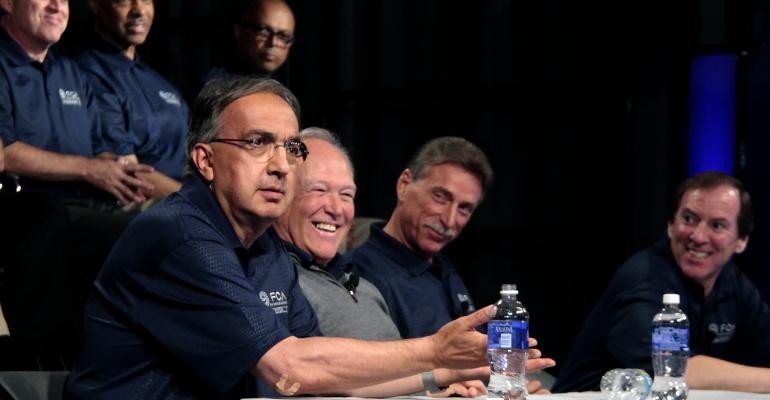The tentative agreement between FCA US and the UAW narrows the salary gap between first- and second-tier hourly employees while opening the door to a third wage tier for workers inside certain operations, union President Dennis Williams says.
The agreement reached last week allows for establishment of a market-based wage for employees engaged in subassembly work insourced from outside suppliers.
“It's always been in the contract,” Williams says, explaining the UAW reactivated the provision in talks with FCA. He says union bargainers’ position was, “Let’s look at the specific job that’s coming in, and let’s do a market evaluation and then look outside the trade union and see what amount of money that job would produce.
“It makes sense because it cuts logistics costs and improves quality.”
A third tier for subassembly workers already is in effect at plants including General Motors’ Orion Assembly and Volt Battery in suburban Detroit.
The tentative FCA-UAW contract restores a system of job classifications that will allow workers to bid for higher-paying jobs within their workplace, Williams says. The deal includes a path to higher wages for new workers.
The path isn’t complete but does set the stage for workers to win additional raises in future contracts, the union president says, adding workers wouldn’t permanently be confined to the third wage tier under the tentative contract.
“We’re trying to be rid of tiers,” he says. “A tiered system is when you don't have a path (to promotion.) People have to have a career path. We’re kind of creating the classification system again, (but) I don’t want 200 classifications. We can do it in different ways.”
The proposed contract includes a 3% pay increase for blue-collar employees who started work at FCA precedessor Chrysler Group before 2007, when the 2-tier system was adopted. Among those first-tier workers, assemblers are paid $28 an hour and tool-and-die makers receive $32.71. They would get another pay increase in the contract’s third year and would receive 4% lump-sum payments in both the second and fourth years.
Second-tier workers, those hired after 2007, would start at $17 per hour, up from $16 in the previous pact, and increases in each of the new contract’s four years to $22 per hour. Workers with three or more years of seniority who don’t fit into the traditional category would see their salaries rise from $21 per hour to $25.35 per hour.
Williams acknowledges the proposed contract falls short of the union’s goal of eliminating the gap between employees hired before 2007 and newer workers hired in the aftermath of the recession in which Chrysler Group went bankrupt and required a federal bailout to stay in business.
“We set the stage for the people that come after,” Williams says.
Bonuses, Profit Sharing, U.S. Investment
All 40,000 FCA workers would collect a $3,000 signing bonus, however. The tentative contract also revises the profit-sharing formula so each worker would get $800 for every 1 percentage point in profit margin generated by FCA in North America.
The deal includes additional bonuses for meeting key quality and productivity targets, which could add between $4,000 and $13,000 over its 4-year term, according to a contract summary released by the UAW.
The proposed agreement does not require FCA to create a certain number of jobs over the next four years. The job-creation guarantees had been a feature of the 2011 contract as the industry was emerging from a steep recession.
FCA has promised the UAW it would invest $5.3 billion in new products and in its factories in the U.S. over the life of the contract.
That investment calls for a major realignment of FCA’s production plants, starting with turning the Sterling Heights, MI, car-assembly plant into a truck plant and moving production of the next-generation Ram from Warren, MI, to Sterling Heights. Warren apparently would become a swing plant building light trucks as well as the proposed Grand Wagoneer and additional Grand Cherokee units FCA might need to satisfy export markets in the Europe and the Middle East.
Meanwhile, production of the Jeep Cherokee would move from Toledo, OH, to the FCA plant in Belvedere, IL, while the Toledo plant is retooled for the next-generation Jeep Wrangler and possibly a new Jeep pickup truck. Production of compact vehicles such as the Dodge Dart, Chrysler 200 and Jeep Compass and Patriot would move to Mexico.
The UAW’s executive board has endorsed the tentative contract for ratification. It will be presented to local union representatives over the next few days, but it is not yet scheduled for a vote by the rank and file.
In a letter to FCA US employees, Sergio Marchionne, CEO of parent Fiat Chrysler Automobiles, calls the tentative agreement “a transformational deal” that puts the automaker on a more cooperative and ultimately competitive footing.
“This new contract represents a major step forward in enabling greater and more direct involvement of our workers in the achievement of the strategic objectives of FCA and recognizes the central role that you all play in building our common future,” Marchionne says. “Without you and your commitment, our plan is simply unachievable.”
Besides narrowing the wage gap, the UAW also recovered some contract concessions such as the Easter Monday holiday and double-time pay for Sundays, Williams says. The contract also gives FCA the flexibility to build more of its most profitable vehicles in the U.S., says Norwood Jewell, the union’s chief bargainer with FCA.
The UAW will use the tentative agreement as the pattern for negotiations with GM and Ford, which together employ 102,000 union members in addition to the 40,000 at FCA. The proposal reflects the Detroit Three’s fiscal health as measured by robust sales of new vehicles, which are expected to top 17 million units in the U.S. this year and next.





